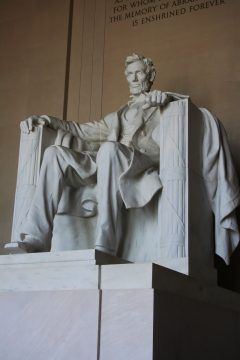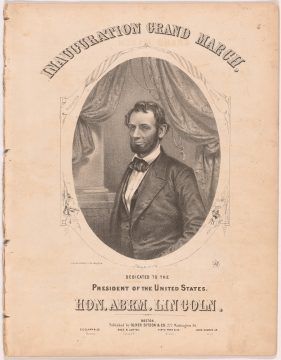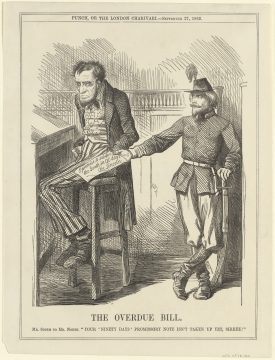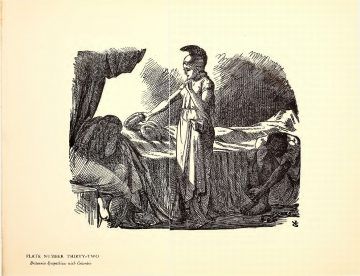by Michael Liss
 He is an enigma. He sits up there in his marble chair, set in a Greek temple, literally larger than life, and he defies us to understand him.
He is an enigma. He sits up there in his marble chair, set in a Greek temple, literally larger than life, and he defies us to understand him.
Many have tried. More than 15,000 books have been written about Abraham Lincoln, to say nothing of countless columns, essays, Masters and Doctoral theses. So familiar is the recitation of his story that there is an unmistakable sense of déjà vu when you pick up yet another, turn to a random page, and, after a few words, half-wonder whether the author was unconsciously participating in a form of soft plagiarism.
Yet, if there is any guide to the inner Lincoln, the double-minded Lincoln, the one who could prosecute an incredibly destructive war while engaging in countless acts of mercy, it has to be in the Second Inaugural Address, the one we remember mostly for its closing paragraph, “with malice towards none….”
In this speech, barely 700 words, is the distilled essence of what Lincoln learned through the wrenching years of seeking, and then possessing, the Presidency. He exposes his own inner anguish as he reconciles it. In doing so, in taking responsibility, accepting nuance, and embracing a broader vision, he sets a standard for “Presidential.”
He does all this in about seven minutes.
We know that Lincoln could argue at great length, and brilliantly. We can see that in the transcripts of his debates with Stephen Douglas and his Cooper Union speech. But at his absolute best, here, and at Gettysburg, he is a miniaturist, each word having meaning.
 The Second Inaugural begins with just two: “Fellow Countrymen.” Because it is merely a salutation, it is easy to overlook, but this particular choice of words is surely deliberate. In his First Inaugural, he began with “Fellow Citizens,” and used “citizens” a total of six times. Citizenship involves an exchange of rights and obligations, and the First Inaugural, through most of the text, is largely about law and duty. Only in the closing sentences, when Lincoln is appealing to emotion and shared experience, did he switch to “Countrymen.” In the Second Inaugural, when the very idea of who is a citizen has been the subject of a brutal and intense war, Lincoln reaches beyond the formal framework of “Citizen” to a single use of the more inclusive “Countrymen.”
The Second Inaugural begins with just two: “Fellow Countrymen.” Because it is merely a salutation, it is easy to overlook, but this particular choice of words is surely deliberate. In his First Inaugural, he began with “Fellow Citizens,” and used “citizens” a total of six times. Citizenship involves an exchange of rights and obligations, and the First Inaugural, through most of the text, is largely about law and duty. Only in the closing sentences, when Lincoln is appealing to emotion and shared experience, did he switch to “Countrymen.” In the Second Inaugural, when the very idea of who is a citizen has been the subject of a brutal and intense war, Lincoln reaches beyond the formal framework of “Citizen” to a single use of the more inclusive “Countrymen.”
Fellow-Countrymen: At this second appearing to take the oath of the Presidential office there is less occasion for an extended address than there was at the first. Then a statement somewhat in detail of a course to be pursued seemed fitting and proper. Now, at the expiration of four years, during which public declarations have been constantly called forth on every point and phase of the great contest which still absorbs the attention and engrosses the energies of the nation, little that is new could be presented.
The progress of our arms, upon which all else chiefly depends, is as well known to the public as to myself, and it is, I trust, reasonably satisfactory and encouraging to all. With high hope for the future, no prediction in regard to it is ventured.
You have to be a little flabbergasted at this opening. It is astoundingly prosaic, and certainly could not have been anticipated by the audience. No exulting in the victories of Grant, Sherman, and Farragut, no extended praise of the fighting man in the field, no applause lines. It is both an expression of Lincoln’s self-confidence in his ability to hold his audience, and a foreshadowing, by omission, of the broader message he intends to convey.
On the occasion corresponding to this four years ago all thoughts were anxiously directed to an impending civil war. All dreaded it, all sought to avert it.
Again, Lincoln surprises. “All dreaded it, all sought to avert it.” The people, his countrymen, whether of the North or South, didn’t want war, but the decision was not altogether theirs.
While the inaugural address was being delivered from this place, devoted altogether to saving the Union without war, insurgent agents were in the city seeking to destroy it without war—seeking to dissolve the Union and divide effects by negotiation.
Lincoln is looking towards the future. He does not want to label all Southerners bellicose secessionists and make reconciliation more difficult. So he separates them from the “insurgent agents” already “in the city” (Washington). Lincoln doesn’t name names, but he doesn’t need to. Many prominent Confederate political leaders had influential roles in Washington before Lincoln’s election, some in Buchanan’s Cabinet.
Both parties deprecated war, but one of them would make war rather than let the nation survive, and the other would accept war rather than let it perish.
To Lincoln, this was an absolutely critical point. There was more than one moral difference between the sides; slavery, of course, but also a political one. Lincoln is stating what to him was obvious: Not only were the secessionists unwilling to accept his election, but they were planning to resist it by force. The Second Inaugural is a remarkably generous speech, yet on the democratic process and the peaceful transition of power, while Lincoln recognizes imperfections on each side, he will not concede moral equivalence.
One might reasonably point out that Lincoln’s formulation seems to have been a little self-serving, and that the choice was not really binary. Why couldn’t Lincoln and the North simply let the South leave? Or why didn’t they offer even more concessions in an effort to save whatever semblance of the Union they could? Certainly, there was no shortage of plans advanced by well-meaning men trying to bridge the gap.
But here you can see Lincoln holding his ground, because he had grasped something from the beginning that many others missed. He understood the difference between mere political opposition, even intense political opposition, and secession. If he had accepted either a compromise that betrayed the issues he had run on, or secession, he would have confirmed the impermanence of the Union for all time. He had to stand firm. As he had said in the First Inaugural, “In your hands, my dissatisfied fellow-countrymen, and not in mine, is the momentous issue of civil war.” They could choose the Constitutional process, introducing legislation while waiting for the next election. Or, they could opt for force. The next move would be up to the seceding States.
And the war came.
One of the most powerful phrases of the entire speech. Its simplicity, finality, and sense of the preordained is a thunderclap. The war came as a result of bad choices people of influence made even if they made them with the best of intentions. Those people included himself. Did he know in 1861 what he was acknowledging in 1865? He partially answers that in the next paragraph.
One-eighth of the whole population were colored slaves, not distributed generally over the Union, but localized in the southern part of it. These slaves constituted a peculiar and powerful interest. All knew that this interest was somehow the cause of the war. To strengthen, perpetuate, and extend this interest was the object for which the insurgents would rend the Union even by war, while the Government claimed no right to do more than to restrict the territorial enlargement of it.
“All knew,” yet Lincoln himself maintained for a very long time that preserving the Union was his first, even his only, motivation. He went so far as to make it clear in the First Inaugural that he would accept a Constitutional Amendment guaranteeing that slavery could continue in the South—this, despite his long-held aversion to the institution. Lincoln (to the endless frustration of the Abolitionists) was a man of law, and the Constitution was law, even when it clashed with his sense of right and wrong. “All knew” is an acknowledgement of an internal contradiction. He would abide by his Oath of Office, but he hadn’t really changed his mind since his “House Divided” speech in 1858. “Either the opponents of slavery will arrest the further spread of it, and place it where the public mind shall rest in the belief that it is in the course of ultimate extinction; or its advocates will push it forward, till it shall become lawful in all the States, old as well as new — North as well as South.” If Lincoln knew, if all the language of compromise (even from those who devoutly hoped for compromise) was whistling past the graveyard, then it’s reasonable to assume that he may also have known his election, and not later secession, was a point of no return. The war would come.
What type of war? A war that shattered illusions:
Neither party expected for the war the magnitude or the duration which it has already attained. Neither anticipated that the cause of the conflict might cease with or even before the conflict itself should cease. Each looked for an easier triumph, and a result less fundamental and astounding.

How revealing a paragraph. Both sides had thought it would be simple, a few skirmishes, bloody the other side’s nose, and it would be over. You can see this jaunty confidence in the editorial pages of newspapers from both regions. Part of what fueled this was arrogance, the North in its sense of material superiority, the South in believing it had better men and better generals. Neither grasped it would be a fight to the finish, Sherman’s “total war.” And neither grasped that slavery itself could be eradicated. Both assumed a status quo afterwards—they would fight over the political question, there would be a winner and a loser, but slavery was there to stay—it was simply a question of whether it would spread, and when.
Both read the same Bible and pray to the same God, and each invokes His aid against the other. It may seem strange that any men should dare to ask a just God’s assistance in wringing their bread from the sweat of other men’s faces, but let us judge not, that we be not judged. The prayers of both could not be answered. That of neither has been answered fully. The Almighty has His own purposes. “Woe unto the world because of offenses; for it must needs be that offenses come, but woe to that man by whom the offense cometh.” If we shall suppose that American slavery is one of those offenses which, in the providence of God, must needs come, but which, having continued through His appointed time, He now wills to remove, and that He gives to both North and South this terrible war as the woe due to those by whom the offense came, shall we discern therein any departure from those divine attributes which the believers in a living God always ascribe to Him?
Something important has happened here. We’ve moved from the secular to the religious. Lincoln shifts language into what almost amounts to a sermon. There is a lot of controversy about this in the academic community. Did this profoundly tested man finally turn to the consolations of religion to soothe his personal pain? We know that virtually every Protestant denomination claimed him for their own. Did he see himself as part of any one of them? Or was he using the then-near universal language of the Bible as a means of communicating civic virtue? There is no easy answer, but whatever his true feelings, the symbolism was potent.
It may seem strange that any men should dare to ask a just God’s assistance in wringing their bread from the sweat of other men’s faces, but let us judge not, that we be not judged.
It is an extraordinary statement, since the obvious response to “judge not” seems self-evident. Of course we judge, and of course it’s wrong. But Lincoln, however deeply felt his moral convictions, is not willing to take this step. Judge not, because the guilt lies upon all, and parsing out who deserves more is beside the point. Judge not, because slavery did not begin with the Confederacy. It was a disease transmitted to this country in the first boats of the first European settlers. Judge not, because it was present, at some point, in every colony, and the benefits flowed not just to slave owners, but also those who directly or indirectly profited from it. Secession was a political sin that could be laid at the door of the Southern leadership. Slavery was the original sin that all shared, either directly, or as an inheritance.
He gives to both North and South this terrible war as the woe due to those by whom the offense came.
The rendering of an account, vengeance, if there is to be any, is not for the North to give to the South. It is permitted to only the morally blameless, those who have suffered the lash.
Fondly do we hope, fervently do we pray, that this mighty scourge of war may speedily pass away. Yet, if God wills that it continue, until all the wealth piled by the bond-man’s two hundred and fifty years of unrequited toil shall be sunk, and until every drop of blood drawn with the lash, shall be paid by another drawn with the sword, as was said three thousand years ago, so still it must be said ‘the judgments of the Lord, are true and righteous altogether.’
With this, Lincoln brings us to the doorstep. He has searched himself and recognized his own frailties and failures, put aside his personal prejudices and found an emotional framework that informs and even comforts him. He believes he can impart that to his audience, both at the Inauguration, and those as a distance. The duration and cost of the war, in lives and in treasure, will be decided not by battles amongst men, but by simple justice—just what is the price for 250 years of suffering? When that price has been paid, but not until it is paid, the war will be over.
Then, his majestic final words:
With malice toward none, with charity for all, with firmness in the right as God gives us to see the right, let us strive on to finish the work we are in; to bind up the nation’s wounds, to care for him who shall have borne the battle and for his widow and his orphan, to do all which may achieve and cherish a just and lasting peace among ourselves and with all nations.
He says, “let us strive on to finish the work we are in.” What is “the work”? Here, I believe, we have arrived at the heart of Lincoln’s sense of history and duty. It asks for more than just the surrender of Southern armies, it demands the North forbear retribution and begin the healing. Bind up the nation’s wounds, repair the breach between all aggrieved parties, and “care for him who shall have borne the battle, and for his widow, and his orphan.” Just as he had acknowledged the North’s complicity, he now embraces the Southern people, if not the Confederacy. Lincoln makes no distinction between either Northern and Southern soldiers, or Northern and Southern non-combatants. They are countrymen, and it is the duty of the victor to care for both.
He closes with an even more compelling imperative, greater than military success or political goals. We have offended God and humanity, and to restore our wounded nation fully, we owe a final duty. We must “do all which may achieve and cherish a just, and a lasting peace, among ourselves, and with all nations.”
 “With all nations” is not a throwaway. The world has seen the brutality and the appalling loss of life. They have watched, with concern, the North grow as an economic and military power. They are wondering what this comparatively new nation, one they have dismissed as crude and uncultured, will do as a newly muscular young adult. At this crucial moment, Lincoln has told them: a lasting peace, with all nations.
“With all nations” is not a throwaway. The world has seen the brutality and the appalling loss of life. They have watched, with concern, the North grow as an economic and military power. They are wondering what this comparatively new nation, one they have dismissed as crude and uncultured, will do as a newly muscular young adult. At this crucial moment, Lincoln has told them: a lasting peace, with all nations.
With that he is done. Historians have long debated whether Lincoln’s reputation could have survived a contentious Reconstruction. We might also ask in what light this speech might be considered if Lincoln had lived to see his hopes for reconciliation thoroughly rejected. It was not to be. In one of the great but tragic ironies, in the audience that day, just yards from the podium, was a young actor, John Wilkes Booth. Less than six weeks later, he rendered both questions moot. Lincoln, and the Second Inaugural—each became “one for the ages.”
The Almighty has His own purposes.
